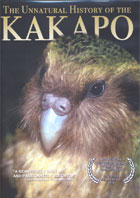
The Unnatural History of the Kakapo 2009
Distributed by The Video Project, PO Box 411376, San Francisco, CA 94141-1376; 800-475-2638
Produced by Elwin Productions
Directed by Scott Mouat
DVD , color, 77 min.
Jr. High – Adult
Birds, Ecology, Endangered Species, Environmental Studies, Evolution, Natural History, New Zealand, Ornithology, Wildlife Conservation
Date Entered: 01/07/2011
Reviewed by Christopher Hollister, University at Buffalo LibrariesAs the title suggests, The Unnatural History of the Kakapo presents the unusual case of this critically endangered wild parrot. Kakapo (Strigops habroptila) is a Maori term for “night parrot,” which aptly describes this flightless, nocturnal bird. Once native to mainland New Zealand, this species was driven to the brink of extinction by human activity, and then by the introduction of non-native predators. Early conservation efforts to save the kakapo involved transporting the few that remained to isolated islands offshore from the country’s fjordlands. These efforts failed, and the species was presumed to be extinct for the better part of the twentieth century.
In 1974 a small population of male kakapo was rediscovered in a remote area of the fjordlands, and in 1981 the first females were found. These birds were transported to New Zealand’s Codfish Island and the Kakapo Recovery Team was created. Viewers of this film are treated to cinematically beautiful and dramatically compelling story. In 2006, when filming of the documentary began, there was a total population of just eighty-six kakapo. When filming ended in 2009, that number had increased to one hundred twenty-four. Intimate footage of the Recovery Team’s passionate conservation efforts during the three years covered is intense and emotional. The reviewer highly recommends this title for academic, public, and school library collections.
Awards
- Merit Award for Human-Wildlife Interaction, International Wildlife Film Festival